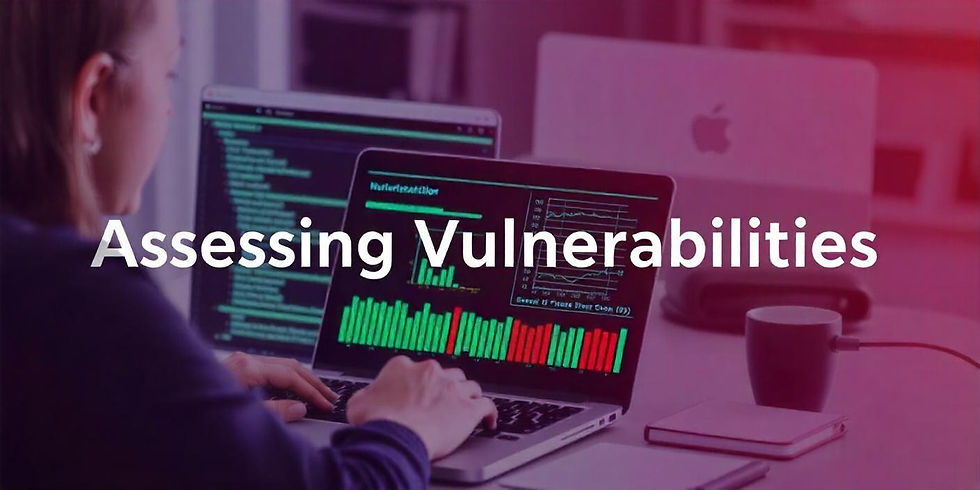The Role of Approved Scanning Vendors in Cybersecurity
- Baran ERDOGAN
- Sep 18, 2024
- 4 min read
Updated: Oct 1, 2024

In today’s evolving threat landscape, vulnerability assessments are essential for identifying and addressing weaknesses that could be exploited by cybercriminals. One of the key players in this process are Approved Scanning Vendors (ASVs), who provide specialized services to help organizations detect vulnerabilities and meet compliance requirements, particularly under standards such as the Payment Card Industry Data Security Standard (PCI DSS).
In this blog post, we’ll explore the role of ASVs in vulnerability assessments, the importance of conducting regular scans, and how organizations can use ASV services to improve their cybersecurity posture.
What is an Approved Scanning Vendor (ASV)?
An Approved Scanning Vendor (ASV) is a company that is certified by the Payment Card Industry Security Standards Council (PCI SSC) to perform vulnerability scans on behalf of organizations. These scans are designed to detect vulnerabilities in networks, applications, and systems that could compromise the security of cardholder data.
ASVs play a crucial role in helping businesses meet PCI DSS compliance, which requires regular vulnerability scanning to identify security weaknesses that could lead to data breaches. ASVs must meet strict criteria and be certified by the PCI SSC to ensure that their scanning tools and processes meet industry standards for accuracy and thoroughness.
Why Vulnerability Assessments Are Important
Vulnerability assessments are a critical part of any organization’s cybersecurity strategy. By regularly scanning networks, systems, and applications, organizations can identify weaknesses that cybercriminals could exploit to gain unauthorized access or cause damage. Vulnerability assessments help organizations:
Identify Weaknesses: Scanning tools can detect vulnerabilities such as outdated software, misconfigurations, weak passwords, and unpatched systems that could be targeted by attackers.
Prioritize Remediation: Vulnerability assessments allow organizations to prioritize the most critical vulnerabilities and address them before they can be exploited. This helps reduce the risk of a security breach.
Maintain Compliance: Many regulatory frameworks, including PCI DSS, require regular vulnerability assessments as part of their compliance requirements. ASVs help organizations meet these requirements by providing certified vulnerability scanning services.
Reduce Attack Surface: By identifying and addressing vulnerabilities, organizations can reduce their attack surface, making it more difficult for cybercriminals to find entry points into the network.
The Role of ASVs in Vulnerability Management
ASVs provide specialized services that go beyond traditional vulnerability scanning. They are certified to perform external network scans to identify vulnerabilities that could be exploited by attackers. ASVs must follow the requirements set by the PCI DSS to ensure that the scans are accurate and effective.
Key responsibilities of ASVs include:
Conducting External Vulnerability Scans: ASVs perform external scans on networks and systems to identify potential vulnerabilities that could be exploited by attackers. These scans focus on the perimeter of the organization’s network, including firewalls, routers, and other public-facing infrastructure.
Providing Detailed Reports: After each scan, ASVs provide organizations with detailed reports that highlight the vulnerabilities detected, their severity, and recommendations for remediation. These reports are essential for ensuring that organizations address critical vulnerabilities in a timely manner.
Ensuring PCI DSS Compliance: ASVs help organizations meet PCI DSS requirements by conducting regular scans and providing the necessary documentation to demonstrate compliance. PCI DSS mandates that organizations perform external vulnerability scans at least quarterly or whenever significant changes are made to the network.
Validating Remediation: Once vulnerabilities have been addressed, ASVs can perform follow-up scans to verify that the remediation efforts were successful and that the organization is in compliance with PCI DSS.
Best Practices for Working with an ASV
Schedule Regular Scans: Organizations should schedule regular vulnerability scans, at least quarterly, to ensure that they are continuously identifying and addressing vulnerabilities in their systems.
Act on ASV Recommendations: After receiving a vulnerability scan report, it’s important to prioritize remediation efforts based on the severity of the vulnerabilities identified. Critical vulnerabilities should be addressed immediately to reduce the risk of a breach.
Monitor Changes to the Network: If significant changes are made to the network, such as adding new systems or applications, organizations should request an additional scan from their ASV to ensure that new vulnerabilities are not introduced.
Use ASV Services as Part of a Broader Vulnerability Management Program: While ASV scans are essential for meeting PCI DSS compliance, organizations should integrate these scans into a broader vulnerability management program that includes internal scanning, patch management, and regular security audits.
How Offensive Security Manager Can Help
For organizations looking to improve their vulnerability management capabilities,
Offensive Security Manager (OSM) provides a comprehensive solution. OSM integrates with open-source scanning tools to help organizations identify and address vulnerabilities in real time. By using OSM alongside services from Approved Scanning Vendors (ASVs), organizations can ensure that they meet compliance requirements and protect their networks from cyber threats.
Conclusion
Approved Scanning Vendors (ASVs) play a critical role in helping organizations identify vulnerabilities and meet PCI DSS compliance requirements. By conducting regular external scans and providing detailed reports on vulnerabilities, ASVs help businesses reduce their attack surface and protect sensitive cardholder data. Integrating ASV services into a comprehensive vulnerability management program is essential for maintaining a strong cybersecurity posture.
If you are looking for a cloud-based and SaaS penetration testing and reporting tool, please check our affiliate solution, Offensive AI, at www.offai.ai.